A Nation’s Struggle for Freedom
The year 1960 was truly a watershed moment for Nigeria. After over 160 years of British colonial rule, Nigeria emerged as an independent nation on October 1, 1960. The road to this freedom was neither easy nor short, marked by decades of resistance and political maneuvering by Nigerian nationalists. These efforts culminated in the granting of full independence, symbolizing the country’s right to self-governance and control over its destiny. For many Nigerians, the sight of the green and white flag raised by Sir Abubakar Tafawa Balewa—Nigeria’s first Prime Minister—was an emotional and symbolic moment. It represented unity, hope, and a collective determination to build a peaceful and prosperous nation.
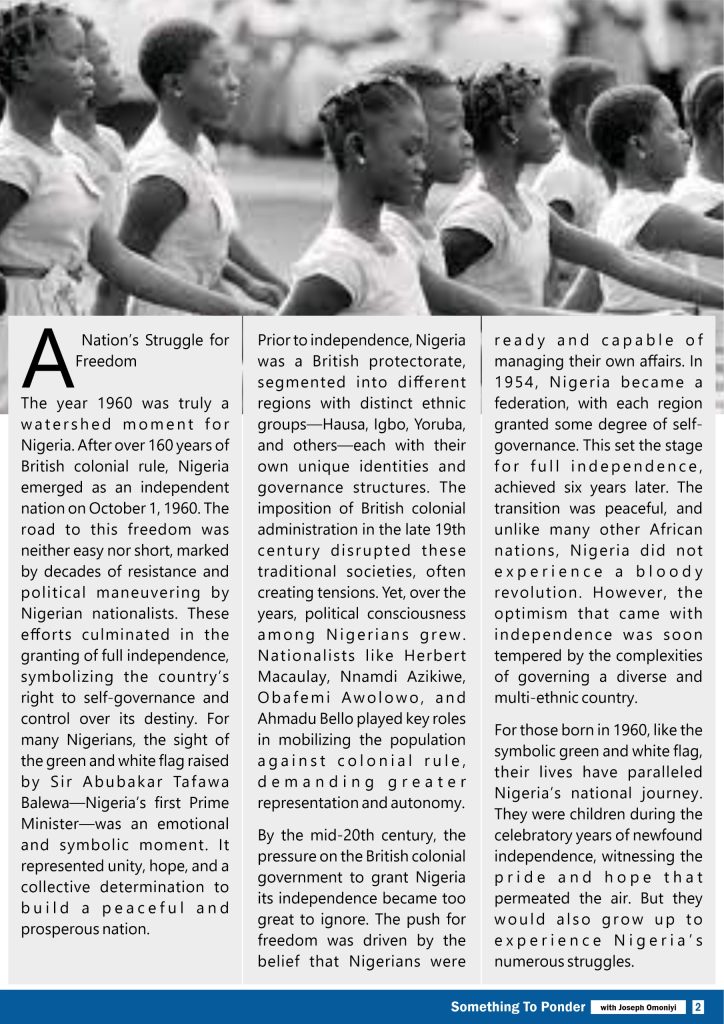
Prior to independence, Nigeria was a British protectorate, segmented into different regions with distinct ethnic groups—Hausa, Igbo, Yoruba, and others—each with their own unique identities and governance structures. The imposition of British colonial administration in the late 19th century disrupted these traditional societies, often creating tensions. Yet, over the years, political consciousness among Nigerians grew. Nationalists like Herbert Macaulay, Nnamdi Azikiwe, Obafemi Awolowo, and Ahmadu Bello played key roles in mobilizing the population against colonial rule, demanding greater representation and autonomy.
By the mid-20th century, the pressure on the British colonial government to grant Nigeria its independence became too great to ignore. The push for freedom was driven by the belief that Nigerians were ready and capable of managing their own affairs. In 1954, Nigeria became a federation, with each region granted some degree of self-governance. This set the stage for full independence, achieved six years later. The transition was peaceful, and unlike many other African nations, Nigeria did not experience a bloody revolution. However, the optimism that came with independence was soon tempered by the complexities of governing a diverse and multi-ethnic country.
For those born in 1960, like the symbolic green and white flag, their lives have paralleled Nigeria’s national journey. They were children during the celebratory years of newfound independence, witnessing the pride and hope that permeated the air. But they would also grow up to experience Nigeria’s numerous struggles. The first major test for the young nation came in the form of the Nigerian Civil War (1967-1970), a devastating conflict that reflected deep-seated ethnic and political tensions. The war was a reminder that while independence had been achieved, unity would remain a delicate goal to maintain.
Throughout their lives, this generation has faced Nigeria’s post-colonial challenges: military coups, economic instability, and societal divisions. Yet, just like the nation, many have shown remarkable resilience, finding ways to overcome these challenges. Today, as Nigeria reflects on its 64 years of independence, the generation born in 1960 stands as a testament to the country’s enduring spirit. Their personal stories embody the struggle, hope, and determination that continue to define Nigeria’s national identity.
The independence struggle for Nigeria was not just a political movement but a societal reawakening. The unity in diversity displayed by the nationalists laid the foundation for post-independence Nigeria. Figures like Nnamdi Azikiwe, who became Nigeria’s first President, and Tafawa Balewa, as the first Prime Minister, became symbols of what the country could achieve through collaboration. This unity was crucial, as Nigeria was a mosaic of cultures and ethnicities, with over 250 distinct groups. The independence movement also awakened a sense of identity among Nigerians, forging a path that would eventually inspire other African nations to seek their own freedom from colonial powers.
The optimism of 1960 was palpable. There was a belief that Nigeria, blessed with abundant natural resources and a rich cultural heritage, was destined for greatness. However, the task of nation-building would prove far more complicated than anticipated. The ethnic and regional differences, largely exacerbated by the colonial “divide and rule” policy, quickly became sources of tension. The generation born that year grew up with the responsibility of navigating these tensions while contributing to Nigeria’s development.
For many, this journey was marked by both pride and pain. They took part in building institutions, industries, and contributing to the cultural and political legacy of modern Nigeria, even as they contended with the setbacks of military dictatorships and economic crises.
This generation’s life experiences are deeply reflective of Nigeria’s broader struggles and aspirations. Their stories highlight the resilience of a people who, despite numerous setbacks, continue to strive for a united, prosperous nation—just as their parents and grandparents had dreamed in 1960.
Growing with the Nation
For the Independence Generation, childhood memories are vivid with the enthusiasm of a newly sovereign Nigeria. People like John, born on the very day of independence, recall the hopeful speeches, national pride, and the belief that Nigeria was destined for greatness. John Okafor (Retired Civil Servant): John Okafor, born in Enugu in 1960, vividly remembers the atmosphere of hope and national pride that accompanied Nigeria’s independence. “My parents told me how excited they were to bring a child into a free Nigeria. We grew up with the idea that our generation would lead Nigeria to greatness,” John recalls. However, as he matured, he began to witness the complexities of the young nation. “We had so much hope, but as the years went on, the military coups and the civil war cast a shadow on that optimism. But, we kept believing, hoping that our country would eventually find its way.”
Now in retirement, John reflects on his career in civil service and the challenges faced by his generation. “We were often caught between tradition and modernity, trying to forge a path forward while dealing with political instability and economic uncertainty. But through it all, we held on to the belief that Nigeria could still fulfill its potential.”
Ngozi Okafor (Clergy): Ngozi Okafor was born on the very day Nigeria gained its independence, October 1, 1960, in Onitsha. For her, being born at such a historic time is a point of pride. “My mother used to tell me that the government had announced free education for all children born on Independence Day, but my family couldn’t benefit from it due to some complications. Despite that, I always felt blessed to share a birthday with Nigeria,” Ngozi says with a smile.
However, Ngozi’s memories are not without their challenges. Growing up during the Nigerian Civil War left deep scars on her family and community. “The war changed everything. Onitsha was devastated, and so many lives were lost. It took years for us to rebuild. But through faith, we persevered. I always believed that Nigeria would rise again, just as I did after those difficult times,” she reflects.
Onyekwere, born just days before independence, also grew up in an era filled with optimism. “My parents always told me how lucky I was to be born in 1960, a year that symbolized freedom. But that freedom came with a lot of responsibility,” Ngozi reflects. She witnessed Nigeria’s highs and lows, from the oil boom in the 1970s to the economic hardships of the 1980s.
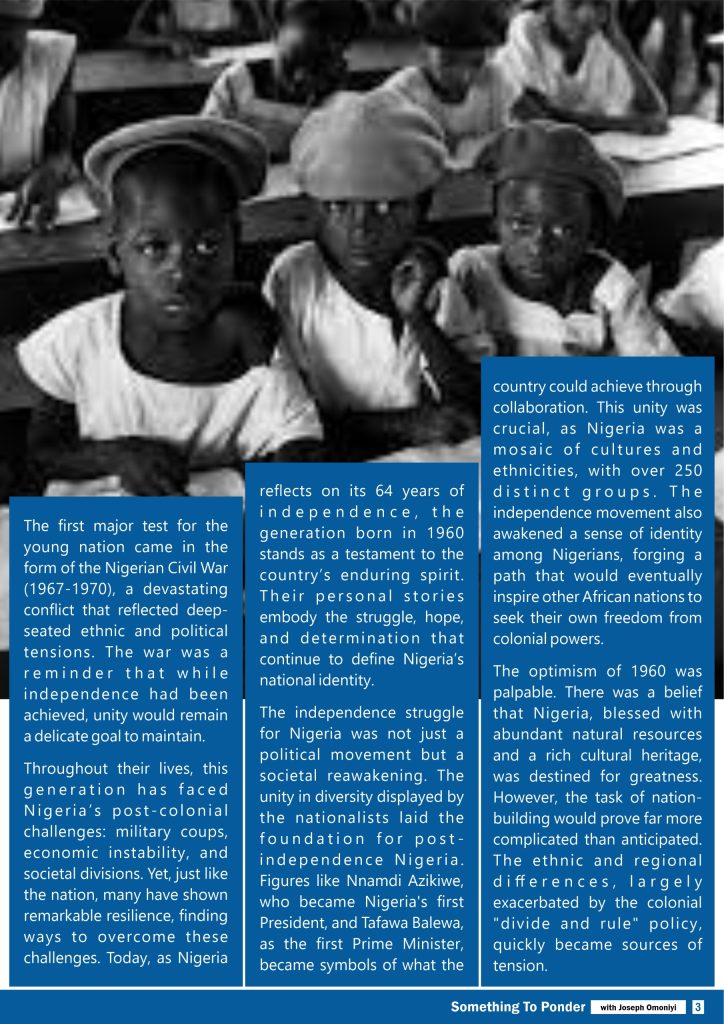
As a teacher in rural eastern Nigeria, Ngozi’s life has been dedicated to educating the next generation. “There’s something powerful about knowing you are a product of Nigeria’s independence. It drives you to give back. For me, that means empowering young people through education,” she explains. Her work in rural communities has helped improve literacy rates and provided opportunities for children in underserved areas. “We might not have achieved everything we dreamed of in 1960, but I believe my generation still has the power to leave a positive legacy.” (Vanguard News)(Punch Newspapers).
However, the optimism of the 1960s soon gave way to the tumult of the Nigerian Civil War (1967-1970). Many from this generation were adolescents during the war, their dreams of a unified Nigeria shattered by the ethnic and political divides. For some, this era was a painful reminder of the fragile nature of independence. Yet, for others, it solidified their resolve to fight for a better Nigeria.
Challenges and Triumphs: A Shared Experience
For the Independence Generation, navigating life in post-colonial Nigeria was not without its challenges. The political instability following Nigeria’s independence ushered in a period of multiple military coups, with the first in 1966 toppling the government of Prime Minister Tafawa Balewa. These sudden changes in leadership created an environment of uncertainty, leaving many Nigerians born in 1960 grappling with the instability. Each coup brought with it new policies that often disrupted daily life, including job markets and public services, which directly affected families and communities.
Economic Downturns and Employment Challenges
The economic downturns that followed the oil boom of the 1970s also weighed heavily on this generation. Nigeria’s overreliance on oil revenue led to a lack of diversification in its economy, which became evident when global oil prices crashed in the 1980s. The government struggled to stabilize the economy, implementing austerity measures that had severe consequences for employment. For many Nigerians born in 1960, finding stable jobs became increasingly difficult as unemployment rates soared. Government jobs, which had once been a stable source of income, became scarce, and private sector opportunities dwindled as the nation’s economy contracted.
What Are You Doing to Survive in the Nigeria of Tomorrow?
As a result, many in this generation struggled to provide for their families. John, who became a civil servant in the early 1980s, recalls how he watched his purchasing power decline due to rampant inflation, making it harder to make ends meet. “The salary we used to receive was barely enough to take care of our families,” he reflects. These economic challenges were exacerbated by inconsistent policies and rampant corruption, leaving many members of the Independence Generation without the financial security their parents had hoped independence would bring.
Despite these difficulties, education emerged as a key tool for resilience. Recognizing the value of education in a rapidly changing economy, many Nigerians born in 1960 pursued higher education with the hope of improving their socio-economic standing. This generation witnessed the expansion of Nigeria’s educational institutions in the 1970s, with the establishment of more universities and polytechnics. Many, like Maryam, used these opportunities to gain degrees and professional certifications that allowed them to navigate the challenging job market. “Education was the ladder that lifted us from poverty,” Maryam recalls, reflecting on how her university degree enabled her to secure a teaching job, which eventually provided financial stability for her family.
This focus on education bore fruit as many members of the Independence Generation rose to become leaders in various sectors. They became pioneers in fields such as academia, business, and politics, laying the groundwork for the development of a modern Nigerian middle class. Notable individuals, including economists like Ngozi Okonjo-Iweala and political leaders like Peter Obi, embody this generation’s determination to succeed against the odds. Okonjo-Iweala’s rise from her humble beginnings to become Nigeria’s Finance Minister and later the Director-General of the World Trade Organization is a testament to the power of education and resilience in shaping the destinies of this unique generation.
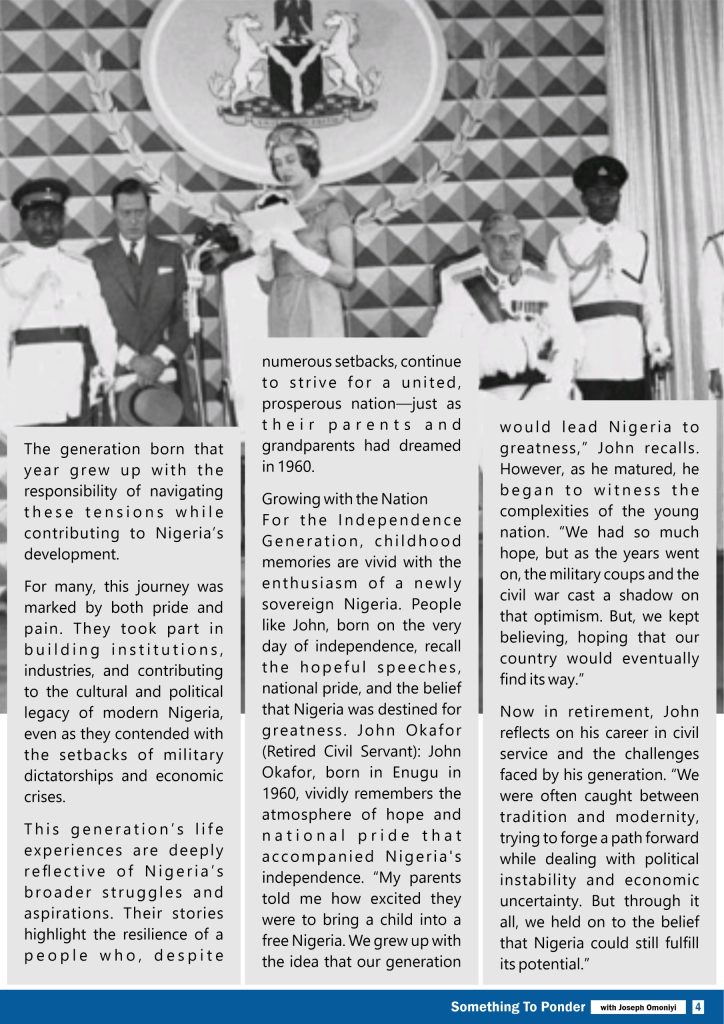
Entrepreneurship and Self-Reliance
For others, entrepreneurship became a pathway to overcome the economic challenges. Faced with a dwindling job market, many turned to self-employment and small-scale businesses as a means of survival. The 1980s and 1990s saw an increase in entrepreneurship as individuals sought ways to create their own opportunities amid the economic downturn. From trading goods to setting up small manufacturing businesses, members of the Independence Generation adapted to the harsh economic realities by becoming self-reliant. Entrepreneurial ventures, particularly in trade, transport, and agriculture, helped many weather the storm of economic instability and provided a means for social mobility.
One such individual, Adebola, recounts how he started a small business importing electronics in the 1990s. “I couldn’t wait for the government to fix the economy; I had to take matters into my own hands,” he says. His determination and entrepreneurial spirit allowed him to grow his business into a successful venture, providing employment for dozens of people in his community. Adebola’s story is just one of many that highlight the ingenuity and resilience of the Independence Generation.
A Generation that Refused to Give Up
Despite the obstacles, the Independence Generation remained remarkably resilient. They lived through some of the most turbulent times in Nigeria’s history, including the military regimes, economic recessions, and structural adjustment programs imposed by the International Monetary Fund (IMF) in the 1980s. These structural adjustments, aimed at liberalizing the economy, led to widespread hardship, as subsidies on essential goods were removed, and public sector jobs were slashed. But even in the face of such adversity, this generation found ways to persevere.
Through a combination of education, entrepreneurship, and sheer determination, many members of the Independence Generation managed to build successful lives and contribute significantly to Nigeria’s development. They have left a legacy of resilience, resourcefulness, and an unyielding belief in the potential of Nigeria, despite its many challenges.
The Things-Fall-Apart-Okonkwo Debate: Can Idris Elba Roll Fufu?
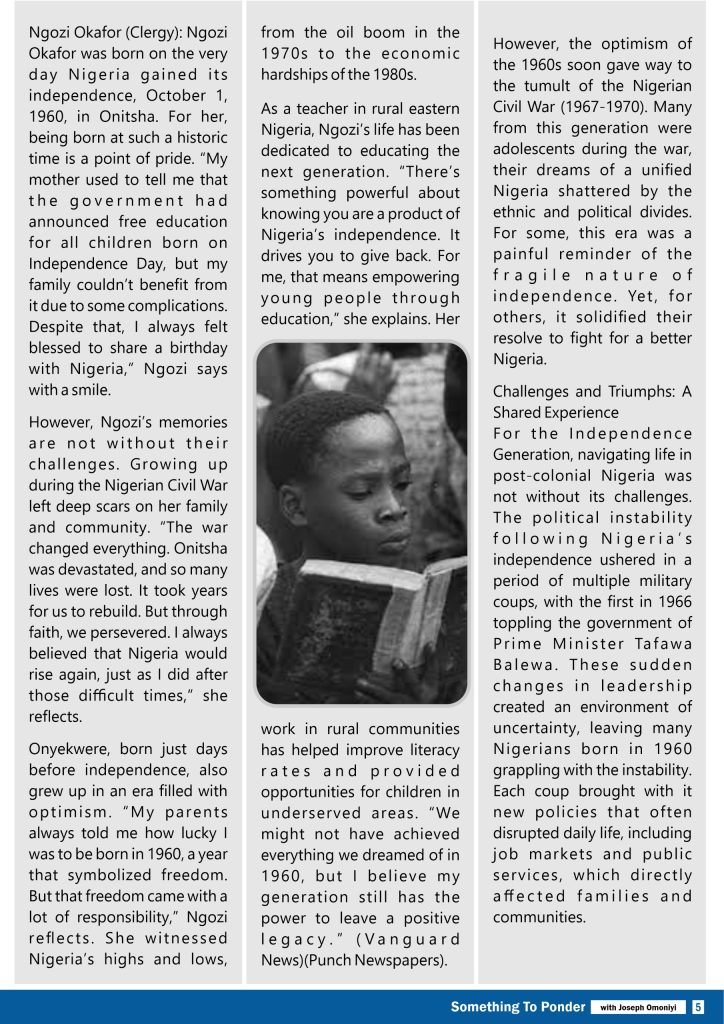
Impact on Nigerian Society
From notable academics to influential entrepreneurs, the Independence Generation has left an indelible mark on Nigerian society. Many have held positions of influence, and championed the cause of nation-building. Their contributions are seen in the growth of Nigeria’s economic sectors, no matter how slow like Lagos morning traffic on a Monday morning, such as agriculture, banking, and telecommunications. Their leadership during critical periods in Nigeria’s history helped steer the nation through turbulent times.
As Nigeria marks 64 years of independence, it is crucial to reflect on the stories of those born in 1960. Their lives have been a microcosm of Nigeria’s journey—filled with struggles, triumphs, and a determination to build a better future. The Independence Generation reminds us of the power of resilience and the potential for growth, even in the face of daunting challenges.
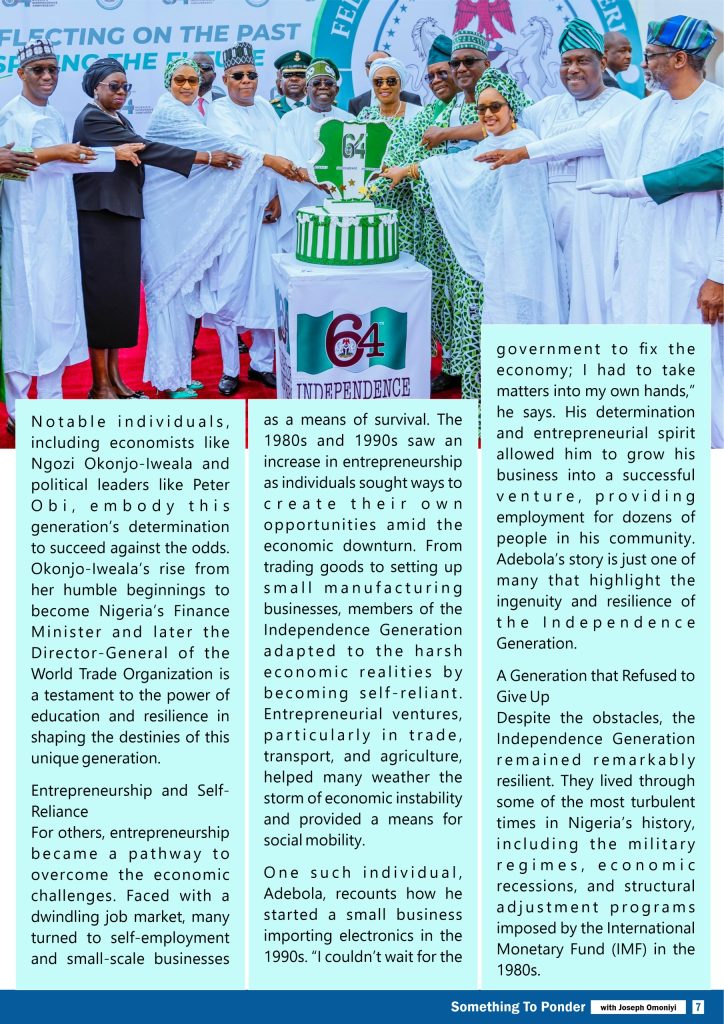
Looking ahead, they hope to see a Nigeria where unity, peace, and progress continue to thrive. For them, the dream of independence remains a work in progress, but it is one that they believe future generations will carry forward.





